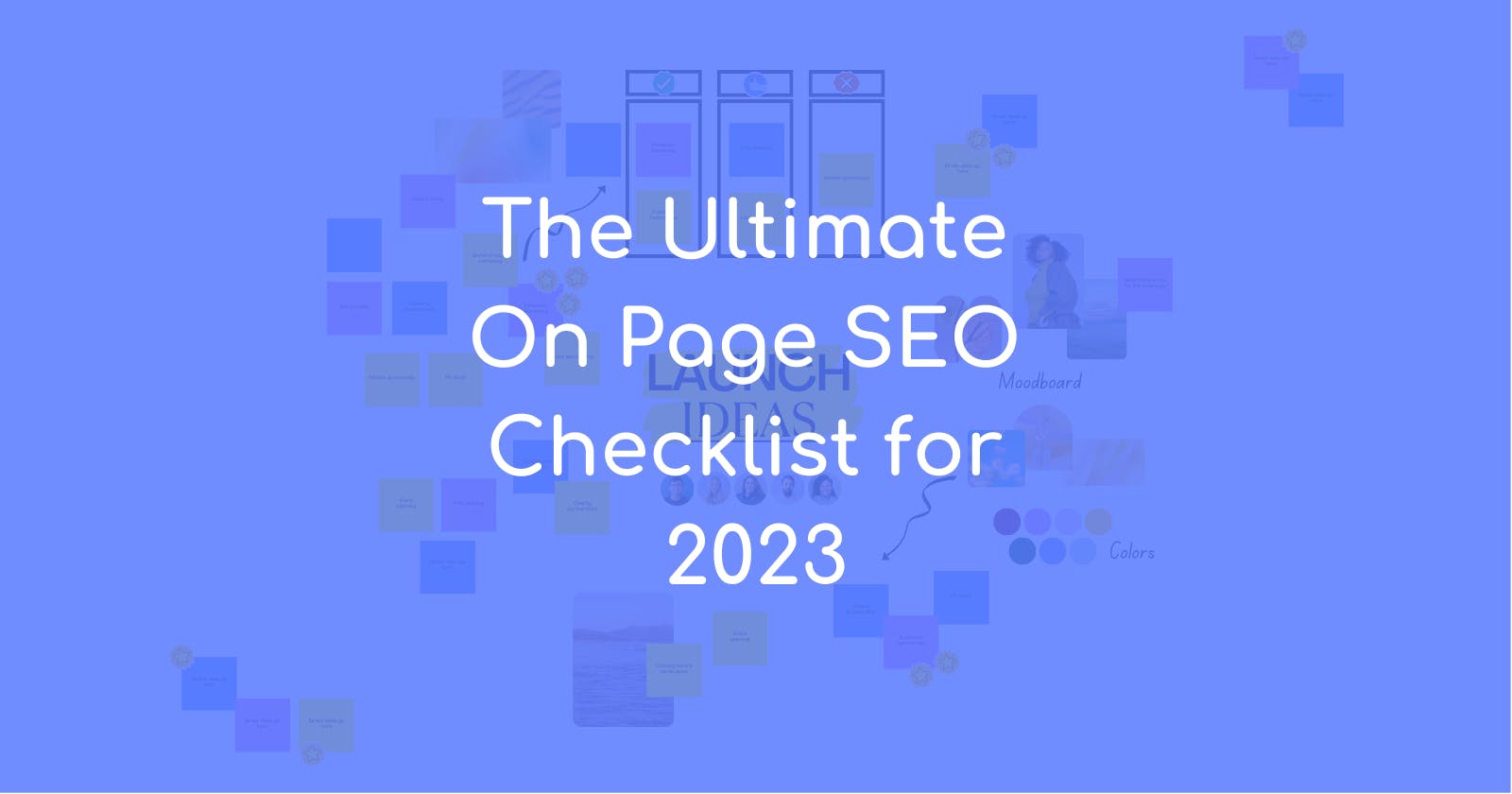On-page SEO is an important factor in the success of any website. It refers to the practice of optimizing individual web pages in order to rank higher in search engines and improve the visibility and traffic of a website. In this blog post, we'll provide a comprehensive on-page SEO checklist for 2023 to help you improve the search engine rankings and drive traffic to your website.
Keyword research
Keyword research is a crucial step in on-page SEO. It involves identifying the most effective keywords to target in your website content in order to rank higher in search results. There are a few key considerations to keep in mind when conducting keyword research:
Relevance: Choose keywords that are relevant to your website content and the products or services you offer.
Search volume: Look for keywords that have a high search volume, as this indicates a strong demand for the topic.
Competition: Consider the level of competition for a particular keyword, as it can be more challenging to rank for highly competitive keywords.
There are a number of tools that can help with keyword research, such as Google's Keyword Planner and Ahrefs. These tools can provide valuable insights into the search volume and competition for different keywords.
Once you've identified your target keywords, it's important to incorporate them into your website content in a natural and relevant way. Some strategies for doing this include:
Using keywords in page titles and headings
Including keywords throughout the body of the text
Using variations and synonyms of your target keywords
Title tags and meta descriptions
Title tags and meta descriptions are important elements of on-page SEO as they help improve the visibility of a website in search results. A title tag is the text that appears in the tab of a web browser and is also used as the headline in search results. A meta description is a brief summary of a web page that appears in search results. Both title tags and meta descriptions should be concise, relevant, and informative, and should include relevant keywords.
Headings and subheadings
Headings and subheadings are important elements of on-page SEO as they help improve the readability and structure of website content. They also provide an opportunity to incorporate relevant keywords and help search engines understand the content of a page. When using headings and subheadings, it's important to:
Use relevant and descriptive keywords
Keep them concise and to the point
Use different levels of headings (H1, H2, H3, etc.) to create a hierarchy and structure for the content
Images and alt text
Optimizing images and alt text is an important aspect of on-page SEO, as it can help improve the visibility of a website in search results. Alt text is a brief description of an image that is used by search engines to understand the content of a page. When optimizing images and alt text, it's important to:
Use descriptive and relevant file names for images
Use alt text that accurately describes the content of the image
Use relevant keywords in alt text, if appropriate
Internal linking
Internal linking is the practice of linking to other pages on your own website. It can help improve the navigation and usability of a website and can also help search engines understand the content and structure of a website. When optimizing internal linking, it's important to:
Use descriptive and relevant anchor text (the clickable text in a link)
Link to high-quality content that is relevant to the topic at hand
Use a mix of different types of links, such as links to deeper
URL structure
A well-structured URL is an important aspect of on-page SEO as it can help improve the visibility of a website in search results. It can also make it easier for users to understand the content of a page and navigate a website. Here are a few tips for optimizing URL structure:
Use relevant keywords: Including relevant keywords in your URL can help search engines understand the content of a page and improve its ranking in search results.
Keep the URL concise: Long and complex URLs can be confusing and may be less likely to rank well in search results. Aim for a URL that is short and to the point.
Use hyphens to separate words: Search engines typically treat hyphens as word separators, so using hyphens can help improve the readability of a URL.
Use lowercase letters: It's generally a good idea to use lowercase letters in your URL as some systems may treat uppercase and lowercase letters differently.
In addition to these tips, it's also important to ensure that your URL is unique and descriptive. A clear and descriptive URL can help users and search engines understand the content of a page and improve its visibility in search results.
Mobile optimization
Mobile optimization is an increasingly important aspect of on-page SEO, as more and more users access the internet from their mobile devices. Ensuring that a website is optimized for mobile can help improve its visibility and usability on mobile devices, which can in turn drive traffic and improve search engine rankings. Here are a few tips for optimizing a website for mobile:
Use responsive design: Responsive design is a design approach that ensures that a website looks and functions well on a variety of devices, including desktop computers, tablets, and smartphones. By using responsive design, you can ensure that your website is optimized for mobile and provides a consistent user experience across all devices.
Optimize page loading speed: Page loading speed is a key factor in the usability of a website, and it is especially important on mobile devices where internet speeds may be slower. Optimizing page loading speed can help improve the user experience and can also help improve search engine rankings. There are a number of ways to optimize page loading speed, such as by optimizing images, using caching, and minimizing the use of large files.
Content quality and length
High-quality, informative content is an essential element of on-page SEO. Search engines value websites that provide valuable and informative content, and high-quality content can help improve search engine rankings and drive traffic to a website. Here are a few tips for optimizing content:
Keep it fresh and up-to-date: Regularly updating and adding new content to a website can help keep it fresh and relevant. Consider publishing new blog posts or articles on a regular basis to keep your content fresh.
Make it relevant and informative: In order to be valuable to users and search engines, your content should be relevant to your target audience and provide useful information. Take the time to research your topic and provide valuable insights and information that will be of interest to your readers.
Ensure that it is of sufficient length: While there is no specific length that content must be to be effective, it's generally a good idea to ensure that your content is of sufficient length to fully cover the topic. This can help improve the value and credibility of your content and can also help improve search engine rankings.
Hope you find the ultimate on page seo checklist for 2023 helpful.

